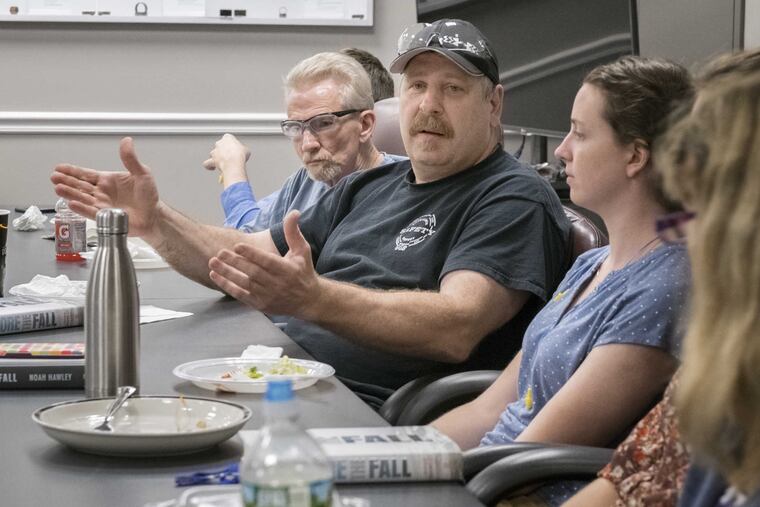Book club silo buster: CEO, factory crew meet to eat and read
What happens when the chief executive and a factory worker join the same book group at work? Tears, insight, equality, perspective - and silos get smashed into smithereens.

What person in his right mind would present his wife with a PowerPoint complete with bar graphs and spreadsheets to make his case for delaying children? No wonder she divorced him!
Yes, that's what happened with a main character in Noah Hawley's novel Before the Fall, and the reaction from the weekly book group at GGB Bearing Technology was close to universal derision.
Except from GGB's engineers, who sheepishly admitted that even though they had never used a PowerPoint that way in their personal lives, they could understand how one of the book's characters — a meticulous airplane crash investigator — might feel compelled to analyze such an important decision with a PowerPoint.
"You get to understand how people think," said Renee Banks, a process engineer at the Thorofare company. Banks wasn't just talking about the character, Gus Franklin, the investigator hired to discover why a private jet crashed, killing nearly everyone on board. She was referring to her coworkers.
And that's just the point of Books@Work, a national program founded in 2012 by Ann Kowal Smith, an organizational strategy and knowledge management consultant. Her idea was to organize book clubs on the job, have them facilitated by professors, and draw participants from all corners of a company. At GGB, the CEO, engineers, finance folks, and production workers meet weekly over lunch to discuss a book, usually a novel.
Take the PowerPoint exchange: It would have never occurred to Banks' coworkers that someone would have that kind of analytical approach to such an emotional decision about having a child. But to Banks and her PowerPoint crew, the opposite seemed equally obvious. Two basic, unspoken assumptions about the right way to think, yet completely different. What happens when those two ways of thinking butt up in the workplace?
"It's horizon-expanding in terms of what other people bring to the table," Kowal Smith said. Since it began, 3,400 people have participated in 180 Books@Work programs in 42 organizations in 16 states and four foreign countries. The typical program costs about $5,000, runs 12 to 16 weeks, covers about 20 people, and includes the cost of the books (one a month) and the fee for the instructor.
Kowal Smith said people become admired for the insight and perspective they bring to the book discussions, regardless of title. "The intimidation melts away," she said. "We realize that the smartest voices don't necessarily belong to the highest hierarchy in the room. It's that false paradigm of judging others based on their roles."
"Companies are seeing the value in this. People who enjoy each other and connect more deeply are going to be more efficient and innovative, too."
That's how Liz Shaffer, GGB executive assistant, sees it. "It helps you open up to talk to people professionally because you've already established a relationship."
Production planner Tom Carchidi agreed. "I feel this is one of the most natural ways to build community. I have a very hectic job. I go to a lot of meetings, but this is the one meeting I look forward to."
Their boss, Susan Sweeney, chief executive of GGB, is a fan. Headquartered in Thorofare, GGB makes specialized bearings for equipment on Mars and in airplanes, automobiles, and industrial machines. A division of EnPro Industries, a holding company with $1.3 billion in 2016 revenues, GGB employs 1,100 people in plants in France, Brazil, Germany, China, Slovakia, and the United States.
Not only does Sweeney participate in the book club in Thorofare, but management teams on the corporate level have their own book groups. They find they provide a way to discuss difficult issues. A short story about mentoring led the executives to talk about how they encourage upcoming leaders. "How do we develop people and give them the confidence to step into new roles?"
In Thorofare, Sweeney said, the book group "is an equalizer. Everyone has an equal voice. There have been some sessions where people have been in tears."
Rich Tutko, a tool and die machinist who has worked at GGB for 28 years, said he loves the group. Everyone teases him and he banters right back. "We get to interact with our front office. It makes me see them as more than people just pushing paper."
At last Thursday's session, Joshua D. Phillips, an instructor in communication arts and sciences at Penn State Brandywine, led GGB's group through the final session on Hawley's book. Phillips posed a question that went beyond the plot and one character's development.
"How do we define mediocrity?" he asked, pulling an example from his experience coaching kids' teams. Many children lack confidence at first, but then some decide they can succeed. "How do people decide if they are successful in life?"
"We limit ourselves by what we tell ourselves," Sweeney chimed in.
"Kids sometimes hold themselves back," Phillips said.
"I think adults do that, too," Sweeney said.
Books@Work:
Here are some of the books that have been the most popular.
The Color Master:
By Aimee Bender. Short story on mentorship describes how a shop's color master passes on the artistic torch to a nervous colleague.
The Color of Water: A Black Man's Tribute to his White Mother:
By James McBride. The book enables meaningful conversations about race, identity, shared values, and parenting.
Bartleby the Scrivener:
By Herman Melville. This story focuses on the relationship between the lawyer and his employees and allowed discussions on workplace styles.
Broken Harbor:
By Tara French. This thriller allows a discussion of the comfortable and uncomfortable aspects of mentorship.